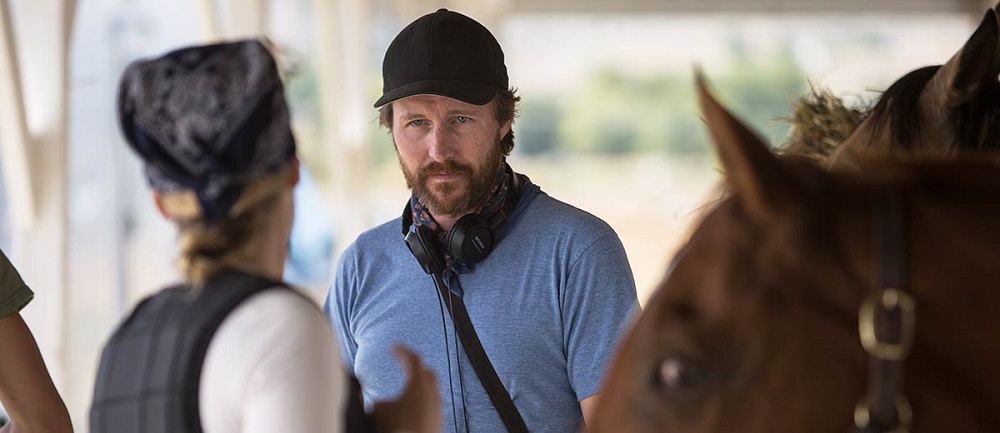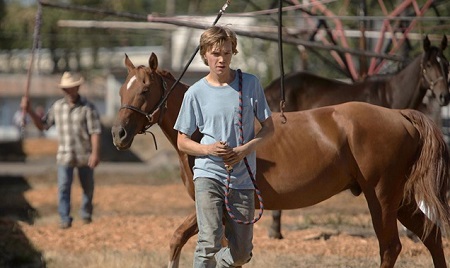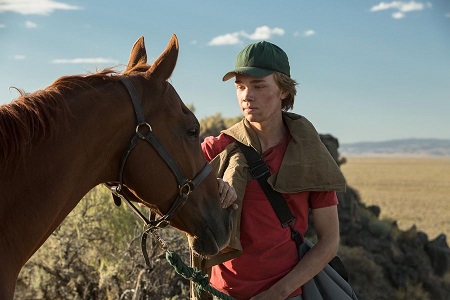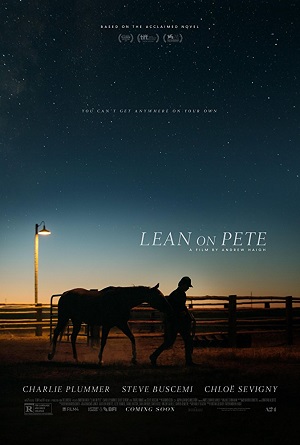
“Lean on Pete” – Interview with Andrew Haigh
by Sara Michelle Fetters - April 13th, 2018 - Interviews
For Pete’s Sake
Andrew Haigh Keeps Things Real with Lean on Pete
I’ve spoken to Andrew Haigh three times now. The first time when he was in Seattle for the local premier of his sensational romantic drama Weekend about a couple of men who meet at a club, hook up for what they believe will be a one-night-stand only to instead spend the entire weekend learning all there is to know about one another. The second time was two short years ago right before the local release of 45 Years, the superb observational drama about a married couple on the verge of celebrating their 45th anniversary who suddenly find a reason to question the validity of their relationship after a long-buried secret is literally found inside a Swiss glacier, the film garnering an Academy Award nomination for iconic actress Charlotte Rampling.
This time I caught up with Haigh via phone to talk about his Portland-set slice of Americana Lean on Pete, the filmmaker’s ambitious adaptation of author Willy Vlautin’s best-selling novel of the same name featuring the likes of Steve Buscemi, Chloë Sevigny and Steve Zahn in key supporting roles. The story revolves around Charley Thompson (magnificently portrayed by newcomer Charlie Plummer), a 15-year-old kid living with his juvenile, if loving, father Ray (Travis Fimmel) in a ramshackle shack near a horse racing track. While out jogging, he runs across local horse trainer Del (Buscemi), and after helping him out the kid is able to convince this stranger to give him a summer job as his assistant.
Things move forward from there, Charlie learning a lot about the horse racing community as he travels from fair to fair, in the process falling in something akin to love with Del’s quarter horse named Lean on Pete. After having his world rocked by a variety of devastating tragedies, the teenager feels the need to try and track down his estranged aunt Margy (Alison Elliott), heading out on an impromptu road trip with the horse by his side as he attempts to track her down.
The movie is an authentic emotional marvel, moving from one spellbinding scene of truth, consequence and understanding to another. As such, I was understandably excited to have the opportunity to chat with Haigh once again about his latest motion picture. Here are some of the highlights from our all-too brief conversation:
Sara Michelle Fetters: Am I correct in that you discovered Willy Vlautin’s novel while you were working on Weekend and then decided to marinate on it for a little while?
Andrew Haigh: Yeah. Sort of. The timeline is just a tiny bit off. I’d actually read the book right after I finished Weekend. I was able to get the rights to the story from Willy pretty quickly after that. I just loved it so much. But this was all before I made 45 Years, so we had to sit on the rights for a little while so I could go off and make that as well as try to figure out how to write a script from Willy’s novel. But then I was also working on “Looking,” so the time from when I discovered the book to the time I could get around to writing that script just kept getting longer. These things do tend to stack upon themselves after a while.
Sara Michelle Fetters: What was it that captivated you about Vlautin’s novel? Why was this project you seemed so determined to return to even with so much else on your plate?
Andrew Haigh: It was just how I felt about Charlie, I suppose. I fell in love with that character and I really found his journey both incredible heartbreaking and tragic, but also inspiring and uplifting. His resilience in the face of so much hardship, and his determination to find some sort of comfort, I found all of that incredibly touching. After I’d read the book I kept talking to people about Charlie and I’d suddenly start to cry as if he were a real person.
I have to feel real strongly about a project in order to do it. As you observed, it takes years sometimes to get these projects off the ground. But I just loved Charlie so much. I just knew this was a story I wanted to keep hold of.
Sara Michelle Fetters: I love how your films just ooze authenticity. I always feel like I could step right through the screen and start living in them. But both Weekend and 45 Years are, in many ways, such inherently British stories. What was it like immersing yourself in Pacific Northwest culture to prepare to make Lean on Pete? It’s such a uniquely American story, and yet, at the same time, you have made it feel so delicately universal.
Andrew Haigh: Oh, that’s great. Thank you for saying that. I think, once I got the rights, I decided to spend a good four months up in the Pacific Northwest right around the Portland area just soaking up everything I could. We’d go into the city. We’d go out into the suburbs. We’d go out to different farms. And we would spend so much time at Portland Downs observing the horse racing and that culture, just trying to learn and understand as much as we could.
It is the little details. Those are the things you have to pick up on and learn about. Those are the things that make you film authentic. We had to go to those fairs and eat those Elephant Ears. We needed to know what they were. This was important, because it’s just one of the many little details you need for the movie to work.
But each State in the U.S. is so inherently different. You have to find those differences in all those numerous environments otherwise Charlie’s journey just won’t work. That’s why I spent a good additional four months just driving around. I drove all the way down to Denver. After that, I actually continued up going all the way to Montana. Staying in motels. Eating in diners. Camping outside. I did all that type of thing. Again, just to soak up the atmosphere a little bit. I needed to do all of that otherwise I don’t think I could have written a script.
Sara Michelle Fetters: Speaking of Portland Meadows, was it difficult to get them to sign on to the film?
Andrew Haigh: It was really difficult. It was very, very touch and go for a while. There was one point where it wasn’t going to happen and we were thinking about trying to go up your way to Seattle to Emerald Downs. But finally at the last moment they gave their approval although we had to change the name of the park from Portland Meadows to Portland Downs.
But, I understand why it took so long. Filming on their property, especially on the backside where all the trainers are, it’s rather intrusive. Yet I’m so glad they finally gave their permission. It’s such an important location in the book. Shooting there just felt right. I think I would have been devastated had they not allowed us to shoot there.
Sara Michelle Fetters: Well, from an authenticity standpoint, I do have to give you a little bit of hard time. Charlie keeps talking about being from Spokane, WA, which just so happens to be my home town. So what’s with this “Forest Creek High School” t-shirt that he’s wearing? None of the actual high schools in Spokane would lend you a t-shirt?
Andrew Haigh: Ha! Oh no! You’ve ruined it! I guess I need to go back into the film and redub it. Do a little CGI on the t-shirt. [laughs] I’m going to have to blame Willy. That school is from the novel, so we can blame him. What do you think?
Sara Michelle Fetters: Works for me. [laughs]
So, I knew Charlie Plummer was a decent little actor with tons of potential the first time I saw him in something. Even then, I was not remotely prepared for just how fantastic he is here. He’s extraordinary.
Andrew Haigh: He’s just so talented, don’t you think? He really is. Just a wonderful young talent. He finds things in scenes, certain kinds of emotional levels, that I didn’t even know where there. That’s such a difficult thing for actors to do.
I’ve send this before in other interviews, but he really does remind me of Charlotte Rampling. They both try and find something unusual in a scene, something surprising. It isn’t like, I’m going to cry in this scene, or I’m going to do something melodramatic in this scene, it’s instead about finding something more interesting, more internal, more authentic, and I love that. I don’t need to know everything what a character is feeling. In fact, I don’t want to know. I just want to know something is happening behind their eyes, I want to see it there, and Charlie is incredible at that.
Sara Michelle Fetters: Those early scenes, between Charlie and Travis Fimmel, who plays his father Ray, even though we as an audience don’t know a lot about the two characters and their backstory, their performance and the ease in which they interact with one another ends up telling us all we need to know.
Andrew Haigh: That’s so true. For me it’s always a thing that I think most movies do give away too much. In this case, you don’t really need to know that stuff. Instead, it’s about finding the small little details that make a relationship feel real. The fact that his dad is not a one-note character dad, that’s important. He loves his son. He cares about his son. But he also isn’t the best dad. He’s sort of a big kid himself. More a big brother than he is Charlie’s dad. It’s little moments, like were Travis steals the hat off of Charlie’s head. Or the stealing of food off of a plate. It’s all about finding those little tiny moments that make you feel that there is a history between these people. I don’t think you need the other stuff.
Sara Michelle Fetters: Do you find that, for actors like Steve Buscemi, Chloë Sevigny and Steve Zahn, that it’s become easier to convince them to appear in a little low budget drama like this one after the success you’ve had with Weekend, 45 Years and “Looking”?
Andrew Haigh: I think it definitely helps. Yes. But I also think it takes a certain type of actor to pursue a role in a film like this one. These supporting roles, they’re really rather odd. They drift in and out of the story at different intervals. They don’t get their big dramatic endings. They don’t reappear.
Which, for me, is what I always found so fascinating about the story. It feels so much more true to life. People come into our lives and they drift out of our lives. They don’t all always get to stay a part of our lives forever. And all of the actors understood that. They embraced that challenge. And they’re all incredible. I’m so happy they all wanted to be a part of the film.
But, yeah, I never would have gotten any of them without the other movies. It certainly helps to get actors like Buscemi and Chloë Sevigny when you’ve had a bit of success.
Sara Michelle Fetters: When Steve Buscemi does show up, what was it like shooting those scenes with him? He’s just wonderful.
Andrew Haigh: He really is. But we talking a lot about the character and his place in the film. I just didn’t want him to pop up out of nowhere and have people be like, “Oh look, that’s Steve Buscemi!” I didn’t want it to be this big thing. And he totally bought into that. So, when we first see him, we don’t actually see him at all. We hear him. Charlie finds him. And so, even though we’re introducing this new, vital character, the scene is still all about Charlie and his story.
But Steve Buscemi was just such a great presence on set. He’s so thoughtful and kind as an actor. He was so generous to Charlie as an actor. I couldn’t have asked for me. It was really great.
Sara Michelle Fetters: I think, for people who have never read or are unfamiliar with the book, this is an easy movie to get a false sense of security about. You really think you know where things are heading, that you know what is going to happen. Then you pull the rug out in an entirely unexpected way. Were you worried at all that, what worked so well in a book, might not work as well in movie? Were you worried you might potentially lose the audience?
Andrew Haigh: It’s tricky. I believe I know what you’re referring to, and I appreciate your not spoiling it for the audience. But, that moment, it’s a tricky moment in the book and it’s an especially tricky moment in the movie. It ends up being all about balance. It’s also about how much are you willing to show. I mean, you need to show the incident but, if you go too far, it might become exploitive or sensationalistic, and you don’t want to lose the audience emotionally.
I do think, when you have a story that seems like it’s about a boy and his horse, certain expectations come along with that. As such, it’s really hard to change those expectations. I mean, even if the movie is called Lean on Pete, which is also the name of the horse, the story has really always been about Charlie. That’s always the focus. But, yes, those changes, those shocking moments, they are tough. Figuring out what an audience can deal with and what they cannot deal with. It changes for every person. So we spent a lot of time on that scene. A lot of time.
Sara Michelle Fetters: I noticed going through the production notes, Allison Elliott isn’t mentioned anywhere. Am I not supposed to mention her? Is there some sort of spoiler involving her character I’m supposed to be keeping secret?
Andrew Haigh: Well, if there was you just ruined it with that question. [laughs]
But, no, we’re not trying to hide anything. I just think when we were writing those production notes we just didn’t want to leave any clues as to where Charlie might be ending up. But her performance and her character aren’t some big secret.
And Allison is terrific, isn’t she? It was such a great thing casting her for that role. There’s some sort of ideal, I think, about who that character is supposed to be, and we wanted someone who could make a more grounded version of that ideal, a more complicated version of who that character might be. And Allison just does a wonderful job of that. She’s very good.
Sara Michelle Fetters: Changing gears for a moment, what were the conversations between you and cinematographer Magnus Nordenhof Jønck like? How did you achieve the visual look of the film, especially during that poetically lyrical midsection after Charlie hit the road?
Andrew Haigh: We talked a long time about how we wanted to feel. That was really all it was. It’s all about how you get across certain emotions especially if you’re not using a lot of music and there really isn’t any dialogue. You’re not manipulating the audience through those kinds of means, so you have to find a visual way to tell your story from that emotional perspective.
We wanted it all to feel grounded in reality. The film needed to have a beauty to it, but hopefully not in a traditional sense. We wanted there to still be a gritty feeling to it all. So, gritty but still beautiful, and doing it without pushing too hard with that visual poetry. And Magnus truly is an artist. His work speaks for itself.
Sara Michelle Fetters: I have to wrap things up, and I know I’ve asked you this question in both our previous two interviews, but it just feels so appropriate once again considering this is a such an emotional story that really asks its audience to feel something as they watch Charlie’s story play itself out. With that in mind, what do you hope people are talking about as they exist the theatre? What do you hope they are feeling?
Andrew Haigh: Those are the key questions, aren’t they? It’s really interesting what people are feeling and talking about after the film. For me, I always want the film to linger on in someone’s mind. I want them to go home and then maybe some random image will pop in their head and they’ll suddenly smile.
Personally, I think the movie is about the importance of kindness, about having compassion for those that are having such difficult lives. I think that’s what I would like people to take away, the thought that maybe we could all be a little bit kinder to one another.
Sara Michelle Fetters: Andrew, I lied. I do have one more quick silly question. Your first film way back when was Greek Pete. Now we have Lean on Pete. Is there going to be a capper to what is obviously a “Pete” trilogy?
Andrew Haigh: That’s hilarious. [laughs] I think there’s going to have to be, don’t you think? Things can’t come in twos. It feels like the Universe will collapse if you don’t complete the trilogy. I think at some point, maybe when I’m like 70, I’ll just have to make something else with the name “Pete” in the title. You know. For the Universe.
– Interview reprinted courtesy of the SGN in Seattle







